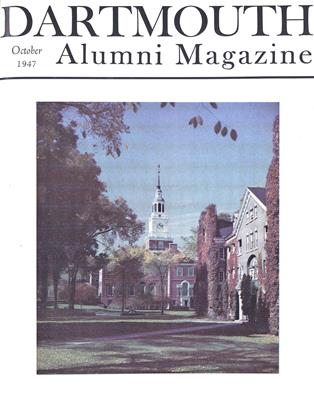This fall marks the beginning of a second decade in the history of the present type of class endowment funds presented to the College as 25th Anniversary gifts. Interestingly enough it also marks the first year in which one of the "larger classes" has reached the peak of its effort in this direction. The Class of 1923 will largely complete its fund during the months just ahead in anticipation of its 25th Reunion next June, and naturally a great deal of interest centers upon its work as a measure of what is possible for classes of that size.
As reported in the July issue, the Class of 1922 topped all classes of its size by presenting $29,000 at its reunion. At the same time the Class of 1912 highlighted the growth of these endowment funds among classes past their 25th by presenting $15,000 to the College.
When the Class of 1913 created the first of these funds in 1938 it was greeted as a step of great significance for the future financial strength of the College, and this view has been more than justified by events. As of June 30, 1947, the grand total of these funds had reached $312,000 and during' the fiscal year 1946-47 alone they produced an income in excess of $10,000. Considering that the first years of their history were marked by the slow growth natural to any pioneering venture, their present development indicates abundant strength and great promise for the future as larger classes participate and as the tradition grows stronger.
So much has been said about the "cost squeeze" which faces all privately endowed colleges today, that there is no necessity to dwell here on the point that a program of regular contributions to college endowment such as these class funds represent is a direct and important contribution to the most important financial problem facing Dartmouth today.
In the forefront of this fall's activity will be 1923's committee headed by Julius A. Rippel and including Sidney J. Flanigan, Clarence E. Goss, Truman T. Metzel, John E. Moore, Lucius S. Ruder, Joseph W. Schiffenhaus, and James G. Young. With $49,450 already contributed by approximately one-third of the class, they have left previous figures far behind as they enter the decisive period before reunion.
The chairmen of the next three classes, Fred C. Shaneman '24, Robert C. Borwell '25 and Robert M. Stopford '26, have indicated that their committees will be active during the fall, building further upon the foundations already laid.
 View Full Issue
View Full Issue
More From This Issue
-
 Article
Article"Enter ye in by the Narrow Gate ..."
October 1947 By ALBERT I. DICKERSON '30, -
 Article
ArticleTHE GREAT ISSUES COURSE
October 1947 By THOMAS W. BRAD EN '40 -
 Class Notes
Class Notes1918
October 1947 By ERNEST H. EARLEY, DONALD L. BARR -
 Class Notes
Class Notes1915
October 1947 By SIDNEY C. CRAWFORD, CHANDLER H. FOSTER -
 Class Notes
Class Notes1913
October 1947 By WARDE WILKINS, ROBERT O. CONANT -
 Class Notes
Class Notes1943
October 1947 By FRED F. STOCK WELL, WILLIAM T. MAECK







